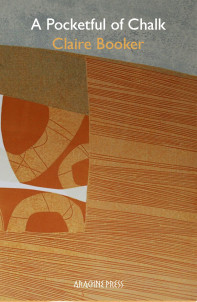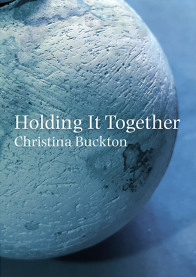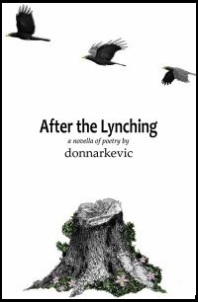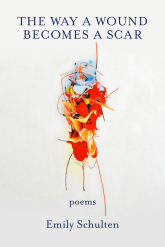
Claire Booker, A Pocketful of Chalk
Lunar Pareidolia
I hold the moon up to the sun.
Light bends, turns corners, throws illusions.
I dust its face for prints.
Some can see a rabbit, an old man,
a goddess. I see the children we might have had.
They don’t hear me. Sound travels
silently through this thin body of space.
They play in a city of faces – not lost,
not vanished.
Every particle of dust is breathing –
a game of hide and seek in long extinct volcanoes,
dreams of astronauts and butterfly nets.
As light bleaches the stars away,
our children fall to earth as meteorites,
rusted and bone dry.
Christina Buckton, Holding it Together
Old Age
I’m a botched job,
my bone beams pieced together
from crooked oaks, thrown up
by workaday cotters, unknown
to themselves, mirrorless,
content with my makeshift flesh,
slipshod mud and cowshit,
that’ll do for now as now
turns into then and comes round again
with the sharp stink of Lad’s Love.
It’s served me well, this old carcass.
Beetles have chawed the underside
of my smoke-stained limbs, time riddles
my veins with wormholes. My hips
straddle secret crevices, open easily
to the noises of flesh, babes born
of my belly, blood on my floorboards.
I offer an arm to the old codger
tumbling to piss in the night. I welcome
wasps. Mice melt themselves into my wainscot.
My neighbours are smart now, their innards
ripped out, replumbed , rewired,
but I don’t want such meddling. I’ll go
my peevish way, keep my flaked and warty plaster,
mutter against facelifts. I’ll sag
into senility, slip sideways
under snow’s overcoat when the cold comes,
hang on to my hens, let them in
to scratch in doorstep dust, keep my ghosts
under the eaves’ huddle, snug as loaves.
Don Narkevic, After the Lynching
After the Lynching
Barefooted, I bust clods in a fallow field.
Dad drives the one-mule wagon
with supplies from the plantation store.
We are what I call shear-croppers.
Mr. Green, the white land owner shears
a third of our cotton,
a third of our baled hay,
a third of anything he has a mind.
I am sixteen. I have a mind.
Right now, I am daydreaming
about running away to a place
where everyone is black like me.
Walking through a wooded patch,
I see it. I have never seen a dead body,
never seen a man dangling from a tree.
I can’t make myself believe.
I yell for Dad, but the words dry up
like weevilled cotton filling my mouth.
I hear Dad whoa the mule.
In a minute he stands beside me
staring up as though Jesus suspends
between heaven and earth. Dad murmurs,
“Throughout Egypt the land was ruined
by flies.” Then I hear them.
Dad tells me to climb the poplar.
I say No.
He backhands me and orders,
“Climb the tree.”
My lips throb, but I won't cry.
He hands me the hog-slaughter knife.
I tuck it in my belt
and climb the goddamned tree.
Going up, I pass feet,
the trousers torn, blood
turning blue on legs. Dad shouts,
“What's taking so long, Will?”
From somewhere I smell shit.
I don't know this guy,
don't owe this guy. So why
am I climbing this goddamned tree?
The bare chest is a honeycomb
of bullet holes. I want to stick my finger
inside a wound to know this is
not a dream. Oh, Lord, my God!
I reach the head. I see
the eyes stare through me.
Is he amazed to see a black boy
in a tree not hanging by a rope?
Climbing out on the gray branch
I marvel at its strength
and wonder if he screamed,
if he showed any fear.
Did he believe in the God
who let His Son hang from a tree?
Did he forgive them
even though they knew what they did?
Reaching the rope,
the knife slices until strands fray,
until the dead weight sways,
until the body collides with the ground.
I see Dad cradle the stiff stranger,
the head on his heaving chest.
Nobody this young should die.
First time I ever see my father cry.
That night, by lantern light,
our axes fell the gallows.
By morning, the tree disappears,
never again to bear the burden.
As the sun rises, the cock crows.
In the barn, we hide the body
under bales of fresh-cut hay.
Tonight, we will find a proper grave,
where only we will go to pray.
Emily Schulten, The Way a Wound Becomes a Scar
The Way a Wound Becomes a Scar
Slowly. The body closes, muscle sutures itself.
The blood dries, the skin shifts from red, purples, shines.
Each day you run your finger over it, it's less.
An itch below the surface. It's there to remind you.
Ancient Egyptians pulled the organs through
a small cut at the groin of the bodies of the dead,
somehow knowing that all these years later,
people would unwrap, inspect the mummy, find
the incision, still evident. You look to find it,
imbedded. There's pain, and then it dulls.
It's frightening how easy it is not to notice a wound,
but how easily you’ll find a scar, after a shower,
standing before the mirror, naked, and remember exactly
its shape, illuminated when you close your eyes.




